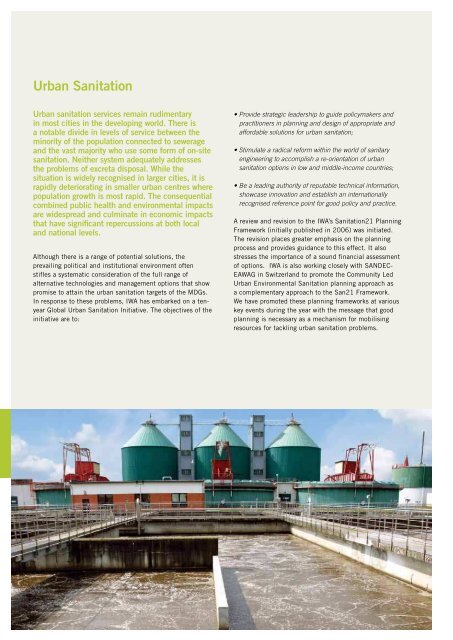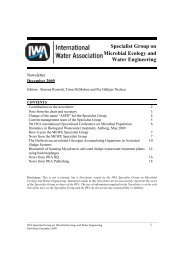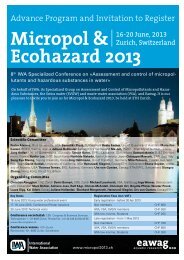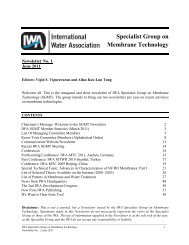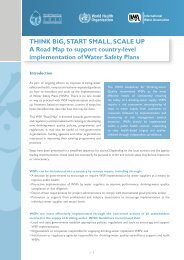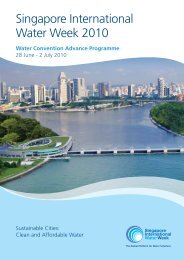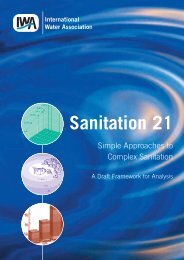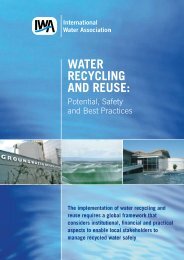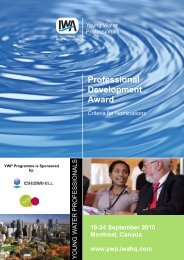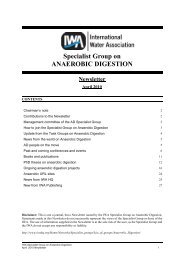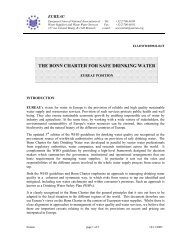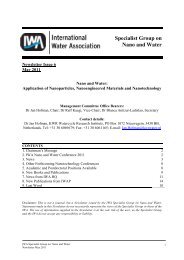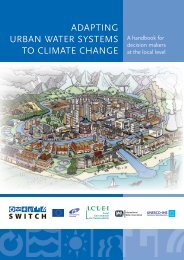Annual Review 2011 - IWA
Annual Review 2011 - IWA
Annual Review 2011 - IWA
Create successful ePaper yourself
Turn your PDF publications into a flip-book with our unique Google optimized e-Paper software.
Urban Sanitation<br />
Urban sanitation services remain rudimentary<br />
in most cities in the developing world. There is<br />
a notable divide in levels of service between the<br />
minority of the population connected to sewerage<br />
and the vast majority who use some form of on-site<br />
sanitation. Neither system adequately addresses<br />
the problems of excreta disposal. While the<br />
situation is widely recognised in larger cities, it is<br />
rapidly deteriorating in smaller urban centres where<br />
population growth is most rapid. The consequential<br />
combined public health and environmental impacts<br />
are widespread and culminate in economic impacts<br />
that have significant repercussions at both local<br />
and national levels.<br />
Although there is a range of potential solutions, the<br />
prevailing political and institutional environment often<br />
stifles a systematic consideration of the full range of<br />
alternative technologies and management options that show<br />
promise to attain the urban sanitation targets of the MDGs.<br />
In response to these problems, <strong>IWA</strong> has embarked on a tenyear<br />
Global Urban Sanitation Initiative. The objectives of the<br />
initiative are to:<br />
• Provide strategic leadership to guide policymakers and<br />
practitioners in planning and design of appropriate and<br />
affordable solutions for urban sanitation;<br />
• Stimulate a radical reform within the world of sanitary<br />
engineering to accomplish a re-orientation of urban<br />
sanitation options in low and middle-income countries;<br />
• Be a leading authority of reputable technical information,<br />
showcase innovation and establish an internationally<br />
recognised reference point for good policy and practice.<br />
A review and revision to the <strong>IWA</strong>’s Sanitation21 Planning<br />
Framework (initially published in 2006) was initiated.<br />
The revision places greater emphasis on the planning<br />
process and provides guidance to this effect. It also<br />
stresses the importance of a sound financial assessment<br />
of options. <strong>IWA</strong> is also working closely with SANDEC-<br />
EAWAG in Switzerland to promote the Community Led<br />
Urban Environmental Sanitation planning approach as<br />
a complementary approach to the San21 Framework.<br />
We have promoted these planning frameworks at various<br />
key events during the year with the message that good<br />
planning is necessary as a mechanism for mobilising<br />
resources for tackling urban sanitation problems.<br />
<strong>2011</strong> Activities<br />
During <strong>2011</strong>, we have been working with the Asian<br />
Development Bank to document case studies of urban<br />
sanitation that highlight the fact that investments can<br />
be sustained by applying appropriate technologies and<br />
management practices. This activity has been supported by<br />
the Specialist Group of Sanitation and Water Management<br />
in Developing Countries. <strong>IWA</strong> also played a key role in<br />
the production of a book by the Sustainable Sanitation<br />
Alliance entitled Sanitation in cities – a framework for<br />
action.<br />
In <strong>2011</strong>, <strong>IWA</strong> commenced work on a publication with<br />
UNESCO-IHP entitled ‘Integrated sanitation - for a better<br />
environment and healthy people’ to be published in 2012<br />
with contributions from members of the Specialist Groups<br />
of Resource Orientated Sanitation and Sanitation and<br />
Water Management in Developing Countries. As part of<br />
this, <strong>IWA</strong> organised a workshop at the 2nd Development<br />
Congress in Kuala Lumpur in November. Also at the<br />
Development Congress, a workshop on ‘Frontiers of Urban<br />
Sanitation Solutions’ was held with presentations from<br />
some leading organisations and specialists focussing on<br />
technology options, management models and assessing<br />
sanitation options.<br />
<strong>IWA</strong> was also active at various other key events<br />
including the following:<br />
• The 35th WEDC International Conference at<br />
Loughborough University, UK in June <strong>2011</strong>. <strong>IWA</strong> organised<br />
a joint workshop focussing on the subject of ‘Environmental<br />
Sanitation Planning for Cities of the South – linking local<br />
level initiatives with city-wide action’.<br />
• A joint seminar at AfricaSan3, Kigali, Rwanda<br />
(July <strong>2011</strong>), organised with United Cities and Local<br />
Governments of Africa (UCLGA) and Local Governments<br />
for Sustainability (ICLEI) on the topic of ‘Urban Sanitation<br />
Service Delivery : thinking about scale from the start’. <strong>IWA</strong><br />
moderated discussions and contributed with a presentation<br />
on ‘Achieving Improvements in Urban Sanitation at Scale:<br />
lessons from strategic planning approaches”.<br />
• Stockholm Water Week – the Five Year drive seminar<br />
convened by UNSGAB and UN-HABITAT: Getting the drive<br />
to 2015 on track in urban settlements. <strong>IWA</strong> contributed a<br />
presentation on ‘Planning for Implementation of City-Wide<br />
Sanitation Solutions’.<br />
For more information about the Urban Sanitation Programme<br />
contact Jonathan.Parkinson at jonathan.parkinson@iwahq.org


